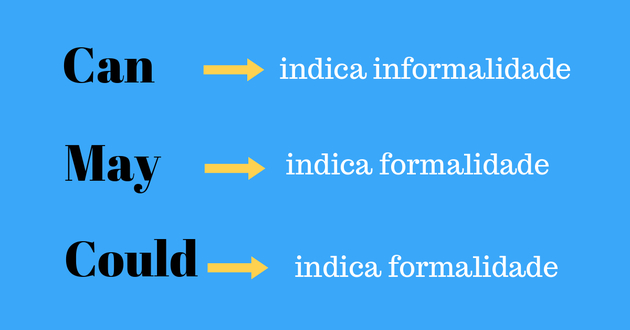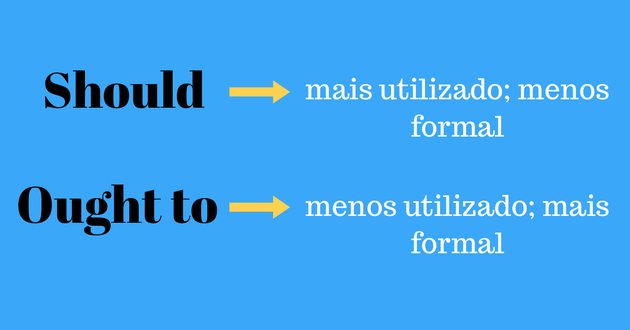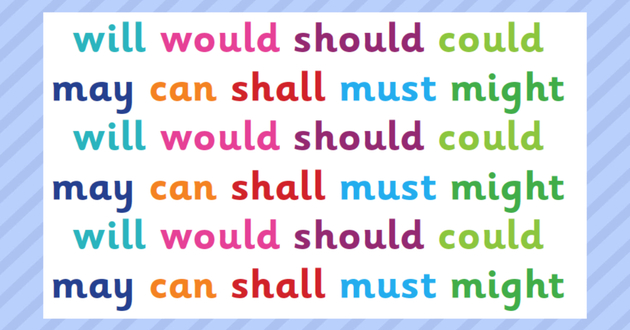The modal verbs in English are auxiliary verbs used to complement or change the meaning of the main verbs in sentences. For this reason they are also called modal auxiliaries (modal auxiliaries).
They are widely used by English speakers and are therefore essential for English language learners.
Examples of modal verbs
See the table with the most used modal verbs in English:
| Modal verb | Most common meanings | Use | Example |
|---|---|---|---|
| Can | can; can | expresses permission, ability, skill and possibility | Permission : Can I go to the toilet? (May I go to the restroom?)Ability / skill : He can speak three languages fluently. (He can / can speak three languages fluently.)Possibility : We can go to the movies . (We can go to the cinema.) |
| Could | could; could; could | expresses permission, skill and possibility | Permission: Could I talk to the director? (Could I speak to the director?)Ability: She could already sing when she was four. (She was already able to sing when she was four.)Possibility: Jane could have been a doctor. (Jane could have been a doctor.) |
| Should | should | express advice, recommendation, suggestion | Advice: You should listen to your mother. (You should hear your mother.)Recommendation : He should wear a suit to the conference . (He should wear a suit at the conference.)Suggestion: He should tell her he isn’t going. (He should warn you that he won’t.) |
| Would | would | express request, wish | Request: Would you help me do my homework? (Could you help me do my homework?)Wish: I would like to have a pizza. (I would like to eat a pizza.) |
| May | can; could | express request, possibility, permission | Request : Mom, may I go to the party with my friends ? (Mom, can I go to the party with my friends?)Possibility : It may rain tomorrow. (It might rain tomorrow.)Permission: May I drink some water? (Can I drink water?) |
| Might | can; could | express possibility | Possibility: It might be sunny on the weekend. (It must be sunny over the weekend.) |
| Must | must | express obligation, prohibition or deduction | Obligation: You must pay your bills. (You must pay your bills.)Prohibition: You must not tell it to anyone . (You shouldn’t tell anyone about this.)Deduction: Laura must be sick. She didn’t come to school today. (Laura must be sick. She didn’t come to school today.) |
| Shall | must | express invitation, suggestion, future action (British English; used with I and we ) | Invitation / suggestion: Shall we travel to Miami? (Are we going to travel to Miami?)Future action: I shall be there at 8. (I’ll be there at 8 am.) |
| Will | it will be | express future action | Future action: They will get married next year. (They will be married next year) |
| Ought to | need, should | express advice | Advice: You ought to call the police. (You should / need to call the police.) |
Attention! (Pay Attention!)
As you can see in the table above, can , may and could be used in similar situations, to indicate permission or request.
However, it is important to note that:

Examples :
- Can I ask a question? (I can ask a question?)
- May I ask a question? (I can ask a question?)
- Could I ask a question? (Could i ask a question?)
Another similar case is that of ought to and should .
Both can be used to express advice.

However:
Examples :
- You should tell it to your mother. (You should tell your mom this.)
- You ought to tell it to your boss. (You should tell your boss about this.)
Grammar ( Grammar )
Modal verbs differ from other verbs on several points. Let’s see below the main characteristics of modal verbs :
They are used without to
Unlike most verbs that, in their original form, are written with to (examples: to go, to dance, to study), modal verbs are always used without ” to “.
There is no infinitive for modal verbs, nor participle, nor gerund.
Examples:
- He may arrive tomorrow. (He should arrive tomorrow.)
- She would like to travel . (She would like to travel.)
Exception : the modal verb ” ought to ” is the only one that is accompanied by “to”. However, the “to” comes after the verb.
In the interrogative form, the “to” is placed after the subject: ought + subject + to + main verb + complement.
In negative sentences, “not” is placed between the verb and “to “ : ” ought not to “.
However, it is not very common to ask questions with ” ought to “, since it is very formal. In that case, ” should ” is used more.
Examples:
- Ought she to go? (Should she go?) – less common
- Should she go? (Should she go?) – more common
Are not inflected
Although some modal verbs indicate the time when an action occurs (such as will – which indicates the future – and could – which can indicate the past), the modal verbs are not inflected.
The same verbal form is used for all people ( I , you , he , she , it , we , you and they ).
Example :
- She can dance . (She can / can dance).
- They can dance. (They can / can dance)

In negatives, not is used after the modal verb.
In negative forms ( negative forms ) the not is added after the modal verb and not after the main verb.
Examples :
- We could not go to the show . (We were unable to go to the show.)
- I should not buy the flower for my mom . (I shouldn’t buy the flower for my mom.)
- You would not eat here . (You wouldn’t eat here.)
- I may not sit here . (I must not sit here.)
- She might not come next year . (She may not come next year.)
- You must not eat this meal . (You must not eat this meal.)
- I shall not begin this course . (I must not start this course.)
- Our friends will not be at home . (Our friends will not be home.)
- We ought not to call the police. (We must not call the police.)

In the negative form, modal verbs can appear in the contracted form:
- Can: cannot – can’t
- Could: could not – couldn’t
- Should: should not – shouldn’t
- Would: would not – wouldn’t
- May: may not – has no contracted form
- Might: might not – mightn’t
- Must: must not – mustn’t
- Shall: shall not – shan’t (no longer in use)
- Will: will not – won’t
- Ought to: ought not – oughtn’t
In interrogatives, the modal verb precedes the subject.
In interrogative sentences ( interrogative form ) is the modal verb that appears before the subject, and not the main verb.
Examples :
- Can I eat hamburgers? (Can i eat hamburgers?)
- Could we go to the show? (Can we go to the show?)
- Should I buy the flower for my mom? (Should I buy the flower for my mom?)
- Would you like to eat here? (Would you like to eat here?)
- May I sit here? (Can I sit here?)
- Might she come next year? (Can she come next year?)
- Must you eat this meal? (Should you eat this meal?)
- Shall I begin this course? (Should I start this course?)
- Will our friends be at home? (Will our friends be at home?)
- Ought we to call the police? (Should we call the police?)
Can be accompanied by be
Modal verbs can be accompanied by the auxiliary be , often followed by gerund (- ing ), expressing present or future tense.
Example :
- She may be buying clothes now . (She may be buying clothes now.)
- He might be arriving late. (He must be late.)
Can be accompanied by have
Modal verbs can be accompanied by the auxiliary have , followed by participle, expressing past tense.
Example :
- You could have bought it before . (You could have bought this before.)
- You should have arrived earlier. (You should have arrived earlier.)
No help needed
Modal verbs do not need to be accompanied by auxiliary verbs in negative and interrogative sentences as they are already auxiliary themselves.
Examples :
- May I drink some water? (Can I drink water?)
- I cannot go to the show.
See also: Simple Present
Shall is used more in interrogations
The modal verb shall is used more in the interrogative form, and generally in the first person singular or plural ( I and we ).
Examples :
- Shall we finish the game? (Should we finish the game?)
- Shall I visit her? (Should I visit her?
Exercises ( Exercises )
1. (FIEB-SP / 2016)
In the fragment from the second paragraph – These connections may allow access to the Internet, for example to show computers in a store… ”- the word in bold indicates
a) need.
b) advisability.
c) request.
d) possibility.
e) permission.
Answer
Correct alternative: d) possibility.
The modal verb may can be translated as it can ; could and is used to indicate request , possibility and permission .
See also: Irregular Verbs in English
2. Which of the following is incorrect?
a) You should go to bed if you don’t feel well.
b) You shouldn’t read in poor light.
c) You must take an aspirin.
d) We could have visitors in the afternoon.
e) You ought to not watch TV without your glasses.
Answer
Correct alternative: e) You ought to not watch TV without your glasses.
The correct way would be to put “not” between “ought” and “to”: You ought not to watch TV without your glasses.
3. (Unesp / 2017)
“One never builds something finished”:
the brilliance of architect Paulo Mendes da Rocha
“All space is public,” says Paulo Mendes da Rocha. “The only private space that you can imagine is in the human mind.” It is an optimistic statement from the 88-year-old Brazilian architect, given he is a resident of São Paulo, a city where the triumph of the private realm over the public could not be more stark. The sprawling megalopolis is a place of such marked inequality that its superrich hop among their rooftop helipads because they are too scared of street crime to come down from the clouds.
But for Mendes da Rocha, who received the 2017 gold medal from the Royal Institute of British Architects this week – an accolade previously bestowed on such luminaries as Le Corbusier and Frank Lloyd Wright – the ground is everything. He has spent his 60-year career lifting his massive concrete buildings up, in gravity-defying balancing acts, or else burying them below ground in an attempt to liberate the Earth’s surface as a continuous democratic public realm. “The city has to be for everybody,” he says, “not just for the very few.”
In the excerpt of the second paragraph “The city has to be for everybody”, the highlighted expression can be replaced, without changing its meaning, by
a) must
b) could
c) may
d) used to
e) going to
Answer
Correct alternative: a) must
Both the expression “has to” and the modal verb must indicate obligation; need.
Check below what each of the alternatives expresses.
b) could indicates permission, capacity, skill and possibility.
c) may indicates request, possibility, permission.
d) used to indicates regular habits of the past.
e) going to indicates actions in the future.
4. What is the correct translation of the sentence below?
When I was in hospital, I couldn’t get out of bed.
a) When I was in the hospital, I didn’t get out of bed.
b) When I was in the hospital, I shouldn’t be getting out of bed.
c) When I was in the hospital, I couldn’t get out of bed.
d) When I was in the hospital, I didn’t want to get out of bed.
e) When I was in the hospital, I didn’t want to get out of bed.View Answer
Correct alternative: c) When I was in the hospital, I couldn’t get out of bed.
In the sentence, the verbal form “couldn’t” was used, which is a contracted form of “could not”.
The verb could could be translated as it could ; could ; could .
Check below which verbs should be used to translate the other alternatives:
a) “… I didn’t get out of bed.” – I didn’t get out of bed
b) “… I shouldn’t get out of bed.” – I shouldn’t get out of bed
d) “… I didn’t want to get out of bed.” – I didn’t want to get out of bed
e) “… I would n’t want to get out of bed .” – I wouldn’t like to get out of bed
5. Write the sentence below in negative and interrogative form:
Doctors could treat infections properly.View Answer
Negative Form: Doctors could not treat infections properly.
Interrogative Form: Could doctors treat infections properly?
To form negative sentences with a modal verb, just follow the following structure:
Subject + modal verb + “not” + main verb + complement.
To form interrogative sentences with a modal verb, just follow the following structure:
Modal verb + Subject + main verb + complement?
